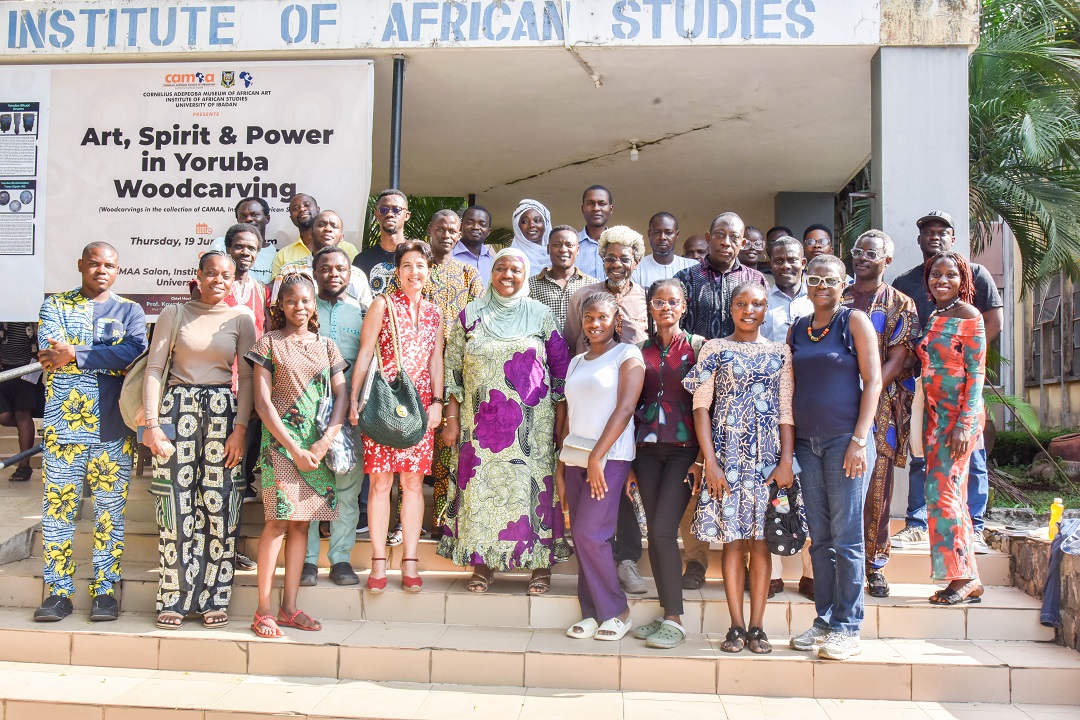IFRA & IAS Seminar - Critical Decolonialities - Dr Mutiat Titilope Oladejo
 On 25 June, IFRA-Nigeria, in collaboration with the Institute of African Studies, University of Ibadan, hosted Dr Mutiat Titilope Oladejo (Department of History, University of Ibadan) and Dr Ayo Adeduntan (Institute of African Studies, University of Ibadan) for another edition of the “Critical Decolonialities” seminar series. The session, titled “(De)Colonial Dynamics of Science-Based Research at the University of Ibadan (Nigeria), 1962 - 1983,” explored the evolution of science-based research at the University of Ibadan (UI) through the dual lenses of colonial legacies and Afrocentric renewal.
On 25 June, IFRA-Nigeria, in collaboration with the Institute of African Studies, University of Ibadan, hosted Dr Mutiat Titilope Oladejo (Department of History, University of Ibadan) and Dr Ayo Adeduntan (Institute of African Studies, University of Ibadan) for another edition of the “Critical Decolonialities” seminar series. The session, titled “(De)Colonial Dynamics of Science-Based Research at the University of Ibadan (Nigeria), 1962 - 1983,” explored the evolution of science-based research at the University of Ibadan (UI) through the dual lenses of colonial legacies and Afrocentric renewal.
Originally established as part of the British "civilizing mission" in Africa, UI has since emerged as a vital space for interrogating and reshaping the production of scientific knowledge.
Dr. Oladejo began by tracing the historical background of university education in Africa, noting how institutions such as UI were conceptualized within a Eurocentric framework aimed at advancing colonial governance and ideology. The establishment of UI in 1947 was framed by a belief that colonial subjects were inadequately educated and that universities could serve as vehicles for upscaling them into the norms of Western civilization.
She highlighted the foundational challenges of research in precolonial and indigenous Nigerian societies, while emphasizing that, despite these obstacles, the post-independence era at UI (from 1962, when it gained autonomy from the University of London, until the withdrawal of Rockefeller and other foreign research funding in 1983) marked a period of dynamic transformation and resistance to colonial epistemologies.
Dr. Oladejo proceeded to define “decoloniality” as a paradigm and method rooted in the critique of colonial and neo-colonial structures of knowledge production. Drawing on dependency theory, she explained that colonial legacies continue to shape African realities, preventing the continent from achieving full epistemic and industrial autonomy. Decoloniality, in her view, reveals the “dark side of modernity” - its foundation on the marginalization, racialization, and objectification of the “Other.” It is not a singular concept, but a contextual and historically grounded method aimed at restoration, validation, and the elevation of indigenous knowledge systems, cultures, and lived experiences.

Citing Badat, Dr. Oladejo noted that African universities have largely mirrored European institutions in their structures, epistemologies, curricula, and languages of instruction. In decolonial discourse, research methodologies are not viewed as neutral tools but rather as mechanisms of control - technologies of subjectivation that hinder the emergence of alternative ways of knowing and being. As such, methodologies often serve as gatekeepers to dominant knowledge paradigms.
To illustrate her arguments, Dr. Oladejo examined various science-based research efforts at UI and their public interface. She reflected on the legacy of science education in Nigeria, from the inferior science curricula of Yaba Higher College to the evolution of interdisciplinary approaches influenced by the Inter-University Council and the American model adopted in England in the early 1960s. However, this interdisciplinary ideal often clashed with UI’s own institutional trend toward compartmentalization.

She further discussed key examples of research at UI:
- Natural product research in chemistry initiated by foreign scholars at University College Ibadan (UCI).
- Dr. Collins’s and Rockefeller-funded research in child health.
- Prof. Akin Mabogunje’s work on urbanization in Nigeria.
- Prof. Ikede’s research on African trypanosomiasis.
- Prof. Oduye’s studies on cattle infections.
Dr. Oladejo also addressed the decolonial features and persistent challenges in science-based research at UI. She referenced a 1973 report by a UI scientist that revealed major obstacles in research communication. While research at UI during this era reflected Afrocentric perspectives and local relevance, it was also deeply affected by broader national issues - political instability in the 1960s, an illusion of economic prosperity in the 1970s, and fiscal austerity in the 1980s.

In her conclusion, Dr. Oladejo emphasized that African universities should not be isolated from global academic systems, but rather rooted in African contexts and cultures. She highlighted how the University of Ibadan (UI) demonstrated this through research driven by local needs and realities. Referencing Makgoba's 2005 address, she emphasized that a truly African university should be globally engaged yet grounded in African identity, drawing strength and inspiration from its own environment - like a tree growing in African soil. This approach enables African universities to be both relevant locally and competitive internationally.
Dr Adeduntan responded to the intervention by commenting on several points raised by Dr Oladejo. He added his own thoughts on the evolution of scientific research at UI from a decolonial perspective.
This session served as a compelling reflection on the ongoing need to reimagine scientific research and higher education in Africa through decolonial frameworks - ones that prioritize indigenous knowledge, historical context, and continental relevance.


Social Media
Mailing List